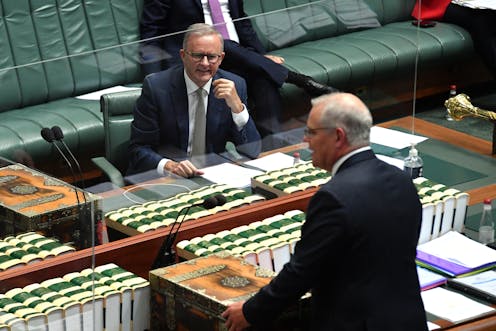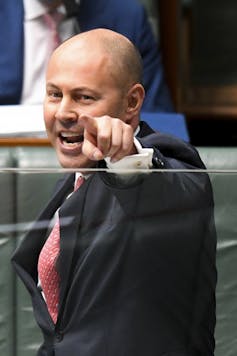
This week’s Newspoll, conducted February 9-12 from a sample of 1,526, gave Labor a 55-45 lead, a one-point gain for the Coalition since the late January Newspoll. Primary votes were 41% Labor (steady), 34% Coalition (steady), 8% Greens (down three), 3% One Nation (steady) and 14% for all Others (up three).
40% were satisfied with Scott Morrison’s performance (up one), and 56% were dissatisfied (down two), for a net approval of -16. Anthony Albanese’s net approval was down six to -6. Morrison increased his better PM lead from 43-41 to 43-38. Figures are from The Poll Bludger.
For most of this term, Newspolls have been published every three weeks, but this Newspoll was released a fortnight after the previous one. That suggests Newspoll will be fortnightly in the lead-up to the federal election.
The big story is the three-point drop in the Greens’ primary vote. It’s possible some Greens supporters are not enamoured with the Greens’ anti-Labor rhetoric and so switched to Labor, and that the Greens are also losing support to climate independents.
If the Greens lost support to Labor, why isn’t Labor up? It’s possible Labor lost support to the Coalition, but the Coalition lost ground to vaccine-sceptical others like Clive Palmer’s UAP.
The overall Labor lead of 55-45 is still strong for Labor, but Essential last week gave Labor just a one-point lead after preferences. Essential and Resolve, which have been the worst polls for Labor since late 2021, are likely to both be published next week.
NSW byelection updates: Willoughby could be close
After originally selecting the Greens as the Liberals’ two candidate opponent in Willoughby, the Electoral Commission has nearly finished re-doing this count as Liberal vs independent Larissa Penn.
Based on preference flows from polling places that have reported a Liberal vs Penn count, the ABC is estimating 51.7-48.3 to Liberal from the current primary votes. But postals have not yet been counted, and there are almost as many postals received to date as votes counted so far.
I suggested in Sunday’s article that, if more left-leaning voters were anxious about COVID, the postals could skew left. Postals almost always skew right in Australian elections, but far fewer people vote by post than at these byelections.
Read more: Mixed NSW byelection results do not imply voters in a 'baseball bat' mood
In the other byelections, Labor’s two party share in Bega dropped from 57.1% on election night to 55.6%, still a 12.6% swing to Labor. In Strathfield, Labor rose from 54.4% to 55.7%, a 0.7% swing to them that was negative on election night. In Monaro, the Nationals were down from 55.0% to 54.9%, a 6.7% swing to Labor.
These changes from the election night figures mainly reflect the addition of pre-poll booths that were not counted on election night. Postal votes will not start being counted until Saturday.
Morgan poll: Frydenberg preferred as Liberal leader

A Morgan federal SMS poll, conducted February 14-15 from a sample of 1,080, had 38.5% of voters preferring Treasurer Josh Frydenberg as Liberal leader, 31% incumbent PM Scott Morrison and 12.5% Defence Minister Peter Dutton.
Coalition voters still had Morrison first with 40%, Frydenberg at 32.5% and Dutton 12.5%. Dutton had his highest ratings (22%), with the independent/other category, which would include One Nation.
Australian jobs report: little change in January despite COVID crisis
The ABS released the January Australian jobs report Thursday. Despite the massive COVID surge in early to mid-January, there was little change from December. Unemployment was steady at 4.2% and underemployment and participation both up 0.1% to 6.7% and 66.2% respectively. This ABC report focuses on the drop in hours worked, which are likely to rebound in February.
The 4.2% unemployment is tied with December as Australia’s lowest since August 2008, just before the global financial crisis. The employment population ratio – the percentage of eligible Australians employed – increased 0.1% to 63.4%, and is higher than at any prior point on the ABS chart in the past ten years.
Bad COVID outbreaks are having a diminishing impact on the overall economy; this was the case in the US in January too. While the jobs situation is good for the government, inflation is not so good.
WA poll: McGowan’s approval slumps to 64%
From the front page of Wednesday’s West Australian, a People’s Voice poll has WA Premier Mark McGowan at 64% approval, 25% disapproval (net +39).
While a 64% approval is very good by most standards, McGowan had a 91% approval rating in late 2020, with just 5% disapproving. His approval dropped to 77% in November 2021.
US Democrats gain in redistricting, but Biden’s ratings still poor
I wrote for The Poll Bludger Tuesday that redistricting of the 435 US federal House seats occurs once a decade after a Census. So far this cycle, Democrats are up 11, Republicans down three and competitive down eight. But Joe Biden has almost overtaken Donald Trump in having the worst net approval of any president at this stage of their term since approval polling began.
Also covered in this article: Boris Johnson remains UK Prime Minister despite the “PartyGate” scandal, the centre-left Socialists won a majority at the Portuguese election, and Emmanuel Macron likely to be re-elected at French presidential elections in April.
Adrian Beaumont does not work for, consult, own shares in or receive funding from any company or organization that would benefit from this article, and has disclosed no relevant affiliations beyond their academic appointment.
This article was originally published on The Conversation. Read the original article.







